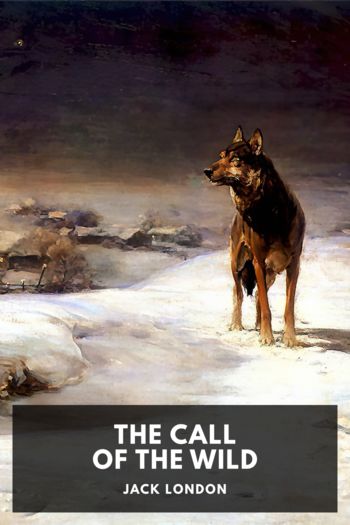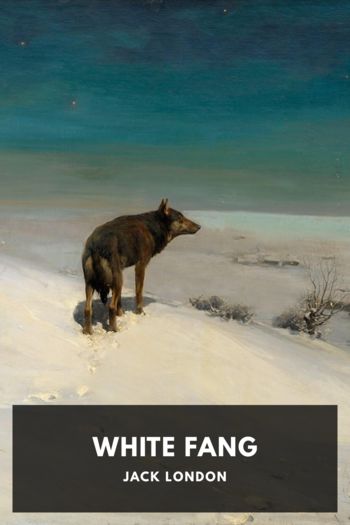The Call of the Wild, Jack London [read me a book .txt] 📗

- Author: Jack London
Book online «The Call of the Wild, Jack London [read me a book .txt] 📗». Author Jack London
And through it all Buck staggered along at the head of the team as in a nightmare. He pulled when he could; when he could no longer pull, he fell down and remained down till blows from whip or club drove him to his feet again. All the stiffness and gloss had gone out of his beautiful furry coat. The hair hung down, limp and draggled, or matted with dried blood where Hal’s club had bruised him. His muscles had wasted away to knotty strings, and the flesh pads had disappeared, so that each rib and every bone in his frame were outlined cleanly through the loose hide that was wrinkled in folds of emptiness. It was heartbreaking, only Buck’s heart was unbreakable. The man in the red sweater had proved that.
As it was with Buck, so was it with his mates. They were perambulating skeletons. There were seven all together, including him. In their very great misery they had become insensible to the bite of the lash or the bruise of the club. The pain of the beating was dull and distant, just as the things their eyes saw and their ears heard seemed dull and distant. They were not half living, or quarter living. They were simply so many bags of bones in which sparks of life fluttered faintly. When a halt was made, they dropped down in the traces like dead dogs, and the spark dimmed and paled and seemed to go out. And when the club or whip fell upon them, the spark fluttered feebly up, and they tottered to their feet and staggered on.
There came a day when Billee, the good-natured, fell and could not rise. Hal had traded off his revolver, so he took the axe and knocked Billee on the head as he lay in the traces, then cut the carcass out of the harness and dragged it to one side. Buck saw, and his mates saw, and they knew that this thing was very close to them. On the next day Koona went, and but five of them remained: Joe, too far gone to be malignant; Pike, crippled and limping, only half conscious and not conscious enough longer to malinger; Sol-leks, the one-eyed, still faithful to the toil of trace and trail, and mournful in that he had so little strength with which to pull; Teek, who had not travelled so far that winter and who was now beaten more than the others because he was fresher; and Buck, still at the head of the team, but no longer enforcing discipline or striving to enforce it, blind with weakness half the time and keeping the trail by the loom of it and by the dim feel of his feet.
It was beautiful spring weather, but neither dogs nor humans were aware of it. Each day the sun rose earlier and set later. It was dawn by three in the morning, and twilight lingered till nine at night. The whole long day was a blaze of sunshine. The ghostly winter silence had given way to the great spring murmur of awakening life. This murmur arose from all the land, fraught with the joy of living. It came from the things that lived and moved again, things which had been as dead and which had not moved during the long months of frost. The sap was rising in the pines. The willows and aspens were bursting out in young buds. Shrubs and vines were putting on fresh garbs of green. Crickets sang in the nights, and in the days all manner of creeping, crawling things rustled forth into the sun. Partridges and woodpeckers were booming and knocking in the forest. Squirrels were chattering, birds singing, and overhead honked the wildfowl driving up from the south in cunning wedges that split the air.
From every hill slope came the trickle of running water, the music of unseen fountains. All things were thawing, bending, snapping. The Yukon was straining to break loose the ice that bound it down. It ate away from beneath; the sun ate from above. Air-holes formed, fissures sprang and spread apart, while thin sections of ice fell through bodily into the river. And amid all this bursting, rending, throbbing of awakening life, under the blazing sun and through the soft-sighing breezes, like wayfarers to death, staggered the two men, the woman, and the huskies.
With the dogs falling, Mercedes weeping and riding, Hal swearing innocuously, and Charles’s eyes wistfully watering, they staggered into John Thornton’s camp at the mouth of White River. When they halted, the dogs dropped down as though they had all been struck dead. Mercedes dried her eyes and looked at John Thornton. Charles sat down on a log to rest. He sat down very slowly and painstakingly what of his great stiffness. Hal did the talking. John Thornton was whittling the last touches on an axe-handle he had made from a stick of birch. He whittled and listened, gave monosyllabic replies, and, when it was asked, terse advice. He knew the breed, and he gave his advice in the certainty that it would not be followed.
“They told us up above that the bottom was dropping out of the trail and that the best thing for us to do was to lay over,” Hal said in response to Thornton’s warning to take no more chances on the rotten ice. “They told us we couldn’t make White River, and here we are.” This last with a sneering ring of triumph in it.
“And they told you true,” John Thornton answered. “The bottom’s likely to drop out at any moment. Only fools, with the blind luck of fools, could have made it. I tell you straight, I wouldn’t risk my carcass on that ice for all the gold in Alaska.”
“That’s because you’re not a fool, I suppose,” said Hal. “All the same, we’ll go on to Dawson.” He uncoiled his whip. “Get





Comments (0)